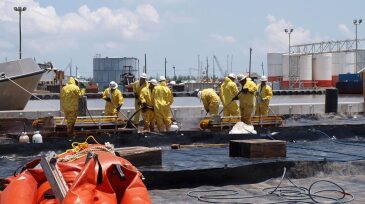Safety
This study ascertains the capital expenditure and operating expenditure associated with the reuse of existing facilities, specifically regarding a carbon capture and storage project being prepared in South Korea.
Sponsored
Advance your career with the new Pipeline Engineering Program at the Technical University of Leoben, a 5-month course combining on-campus and online learning, integrating industry expertise, engineering practice, and future-ready skills for professionals in oil, gas, and emerging energy systems.
A resilience-based approach to safety was the focus of a panel of experts at the 2025 SPE Annual Technical Conference and Exhibition in Houston.
-
The US Department of Labor’s Occupational Safety and Health Administration, which had ceased most programmed enforcement actions following Hurricane Harvey, resumed normal enforcement throughout Texas and Louisiana.
-
What is the reality of risk in the hydrocarbon sector? In this roundtable discussion, senior industry executives discuss what happens when process safety intent meets the reality of operations.
-
A recently published standard addresses the need for a comprehensive set of common requirements for operators and contracting companies at fabrication yards.
-
Not doing process safety tasks correctly the first time can result in grave consequences for you, your co-workers, the community and the environment.
-
Broad agreement on safety and working environment conditions in Norway’s oil industry, and on the measures required in the future, is revealed in a report drawn up by representatives of the employers, unions and government.
-
Safety risks of drilling operations are widespread, with potentially significant consequences. Managing these safety risks is key, and intelligent safety risk software can help.
-
Workers who were likely exposed to dispersants while cleaning up the 2010 Deepwater Horizon oil spill experienced a range of health symptoms including cough and wheeze and skin and eye irritation, according to scientists at the National Institutes of Health (NIH).
-
The results of a virtual reality (VR) safety simulator and gaming experience presented by Lloyd’s Register at SPE Offshore Europe suggest that more needs to be done in training and understanding the daily risks of oil rig maintenance and operation.
-
Onshore and offshore production in Texas and the Gulf of Mexico continues to recover to pre-Hurricane Harvey levels as inspections and assessments of damages are done. Operators have not reported major damages resulting in extended shut-ins.
-
A consortium of organizations has set out to tackle one of the more enduring challenges in the North Sea: the nondestructive testing (NDT) of corroded pipes under insulation and engineered temporary pipe wraps.











